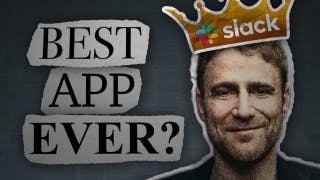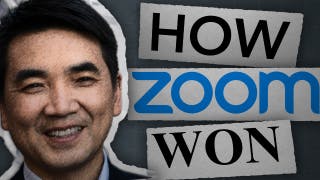
When Microsoft double-crossed Intuit
Hefty fines and prison time. That’s what’ll happen if you don’t have your books in order. You need someone to prevent all the inaccuracies, outdated reports, and unverifiable data that ultimately makes your back office a living hell. It’s a job that often goes thankless. Thankfully there’s an entire segment of businesses that exist to help you out.
At the beginning of 2020, the accounting software market as a whole was valued at $11.9 billion. And it's projected to reach $70 billion by 2030. Several companies are jostling for the ultimate crown like Xero, Sage, and Zoho. But one company has been in the game longer than most.
Today, Intuit has a vast SaaS product line from QuickBooks to Mint, to their recent acquisition of MailChimp in 2021. But not too long ago, they endured a decades-long battle with Microsoft in an effort to win the top spot in bookkeeping.
At one point, the war seemed to be over before it could truly begin, but something happened that forced Intuit to fend off Microsoft in any way that only they could. The result of which gives folks running their own SaaS company many examples to learn from.
But first, if you like this kind of content and want to learn more, subscribe to get in the know when we release new episodes.

Lessons from the Top
Managing business finances is not typically something most business owners look forward to, but it is absolutely necessary in order to run a successful business. In fact, improperly managing your financials will not only be a living hell for you, but you'll likely not have a business for long. There are serious legal implications associated with non compliance and/or improper record keeping. However, the complexities of business accounting are intimidating and are only getting more complicated with time.
Luckily, Intuit understood the intricacies of accounting as well as how the evolution and expansion of technology could facilitate this complex process. Intuit's ability to evolve and transform in line with customers' needs is what makes Intuit an undisputed leader in the accounting software market today, leaving Microsoft in the dirt.
- A solid business model
Intuit's business model was built with the foresight of constant transformation in the space due to the evolutionary nature of technology. It embraces and encourages innovation and transformation across the entire company. It's how the whole business operates. Because of this, hundreds of what started as experimental projects have become successful products or features. - Commitment to customer success & satisfaction
In SaaS, customer relationships are crucial. But nurturing those relationships and maintaining long-term customer satisfaction is not easy. You have to stay close and actively listen to their needs. Intuit's commitment to ensuring its customers are successful, not only in using its product, but that their business as a whole is being set up to succeed, has been key to Intuit's growth and success.
Intuit has been very strategic when it comes to product developments, integrations, and acquisitions. All of these have perfectly aligned to offer a well-rounded solution that better serves its customers. - Make your product a household name
Never underestimate the power of consumer marketing. You may not think of marketing your SaaS product or service as you would a laundry detergent or cereal brand, but maybe you should. In the case of Intuit, its investment in making Quicken a household name paid off big. It was one of the main reasons it was able to defeat a giant like Microsoft.
Background
Today, the flexibility of reporting features in some modern accounting software tools allows you to stay compliant with the complex and ever-changing global tax laws. Payments expert Digital River predicts that within a few years, "nearly every tax authority will have some form of real-time reporting requirement and will likely have a way to plug into a financial system and collect information on a real-time basis." But it wasn’t always as easy as we make it at Paddle.
Accounting dates back thousands of years and has been used in many parts of the world from Mesopotamian civilizations to Italian accounting pioneer, Luca Pacioli, in 1494. But accounting as we know it today started sometime in the last century.
In 1983, Scott Cook went to Stanford University and placed an advertisement for a programmer position. While there, he bumped into Tom Proulx. Proulx agreed to write a simple check-balancing program for Cook. In his dorm, Proulx created the first Quicken program, which he and Scott used to launch Intuit.
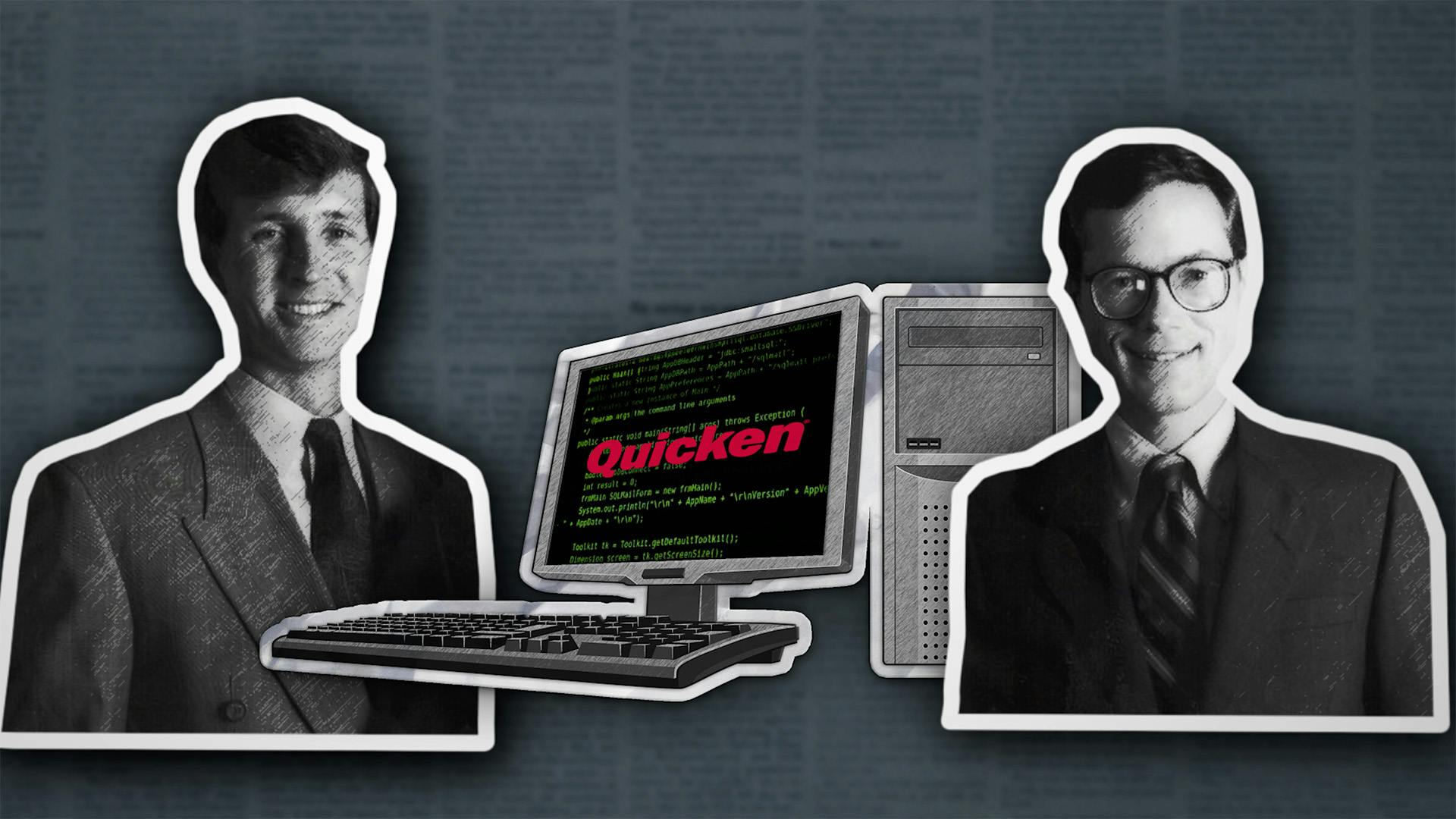
After a few difficult years of trying to popularize the product to no avail, Quicken's Apple version finally started to get positive attention. Consequently, sales hiked. By the late 1980's, Quicken had become one of the best-selling personal accounting software solutions around. Suddenly, Intuit had little problem securing financing. By 1991, the company's sales had skyrocketed to $55 million, up from just $20 million three years earlier.
In 1993, Intuit went public. By this time, Microsoft had launched their own product to compete with Quicken, releasing Microsoft Money in 1991. Realizing that Intuit was in the lead, Microsoft made an offer that they couldn’t refuse.
Early Leaders
In October of 1994, Microsoft offered to purchase Intuit in a stock swap for $1.5 Billion. At the time, it was Microsoft’s largest acquisition ever. Speaking of the acquisition, Bill Gates said "Intuit is a phenomenal company and it is a unique situation where the sum is greater than the parts. Certainly managing finances, in the broadest sense, is one of the major opportunities that the electronic world will present. That is a major part of the future of software and Microsoft wants to be there."
This victory, however, would be short lived. The US Department of Justice sued to block the deal citing that it would effectively give Microsoft a Monopoly of the personal finance market. In their research, the Justice Department found that Intuit’s Quicken commanded 69% of the market, while Microsoft Money had 22 percent. Ultimately, Microsoft decided to pull out of the deal. During negotiations, Bill Gates reportedly told Scott Cook that if Scott fought the merger, he would use the sum that would have gone toward the acquisition towards battling Intuit.
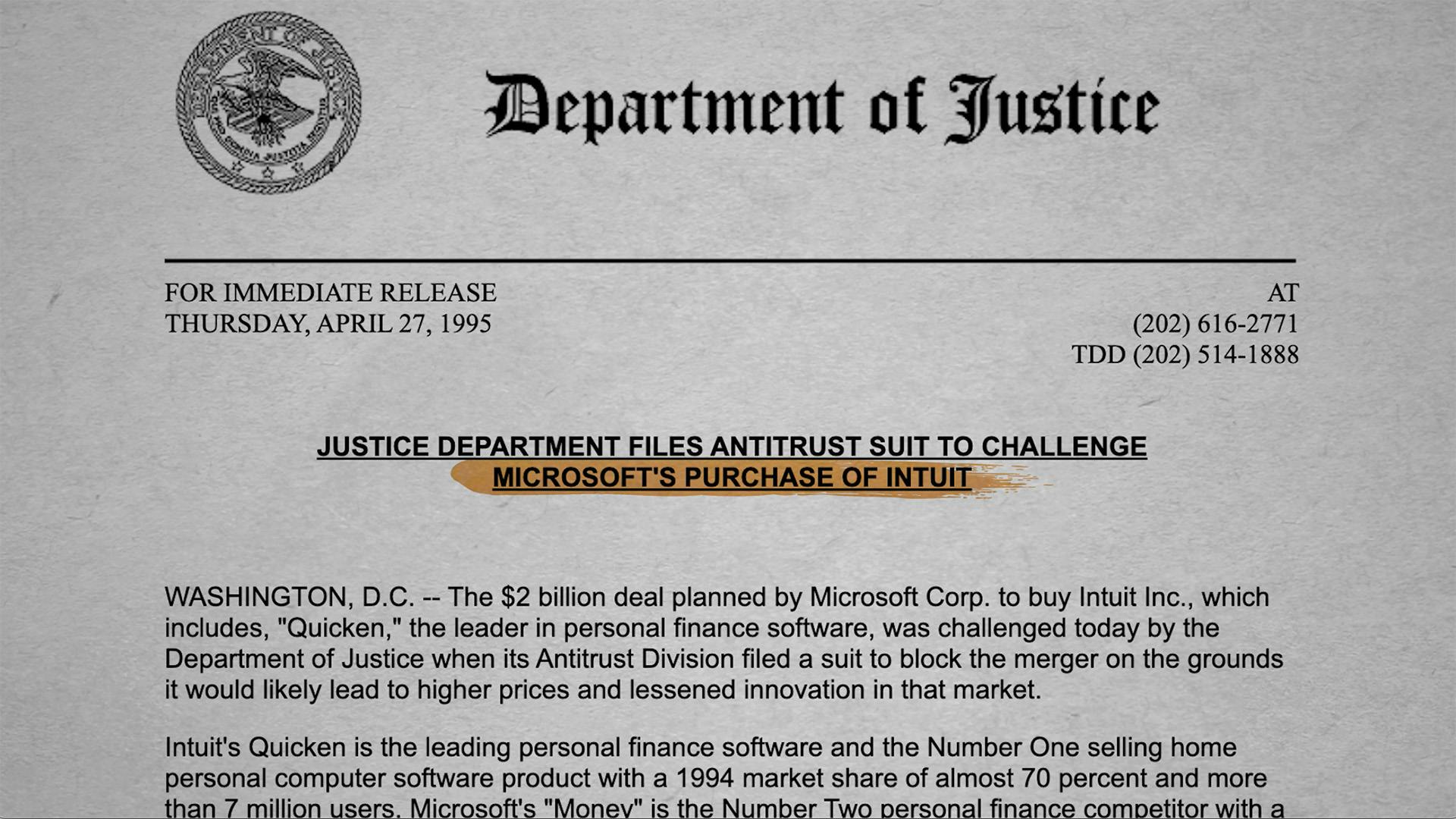
Microsoft went all out to try and dethrone Intuit. The company added a ton of partners, revamped the product's design, and tried to integrate a host of new financial planning tools.
Intuit, on the other hand, had the advantage of QuickBooks, Intended to offer small business owners the same flexibility, structure, and compliance as Quicken did for individuals. And in 2000, the software was improved to include audit trails, double entries, and other industry-level compliant items.
That same year, The Wall Street Journal reviewer, Walt Mossberg, gave Microsoft Money the edge over Quicken. However, even with this positive review, Money never truly managed to overtake Intuit.
Microsoft tried one last time, in 2005, to outmaneuver Intuit with the launch of Small Business Accounting to rival QuickBooks. But like all the previous episodes, the move backfired badly. "They've come up against Intuit six times in the past, and each time they have retreated with a bloody nose," Intuit VP Dan Levin said.
In 2009, Microsoft announced that Microsoft Money would no longer be available for purchase. Competition had been fierce but, ultimately, Intuit won out. It was somewhat surprising that Intuit succeeded, especially considering many computer makers pre-loaded Microsoft Money on new PCs. So, what were the key differences that made Intuit soar and Microsoft plunge?
Reasons for success
The main reason Intuit knocked out Microsoft Money is because they continued to get closer and closer to the customer, including going above and beyond to correct errors.
In 1987, for instance, Intuit got complaints from Quicken customers who were only getting the message "getcache" on the screen when trying to record a transaction. This was back when Intuit was strictly an on-prem solution. Twenty thousand copies had already been sold. So Intuit staff created 20,000 bug-free disks and mailed one to every customer. As a result, customer satisfaction increased.
Additionally, Intuit has made it its mission to pursue strategic acquisitions that play to this overarching goal. Acquiring platforms like Credit Karma, Mint.com, and Mailchimp are aimed at solving pain points tangentially related to Intuit's core accounting offering. Credit Karma allows the company to give folks their credit score, which makes the product sticky. Mint is an automatic tracker of finances, which plugs right into Intuit’s tax software. Mailchimp is a fantastic tool that helps small businesses run more efficiently (For more on Mailchimp, you can check out our previous episode about how Mailchimp gets your email past the spam filter).
In 2011, further expanding on its well-rounded solution offering, the company also launched a platform called Intuit Anywhere, which allowed customers to try out different integrations within the QuickBooks Online ecosystem. Ultimately, this turned into the integrations Intuit offers today with options like Shopify, gusto, and even Etsy. Integrations are important — in a ProfitWell study, we found that customers with more integrations within their product appear to be willing to pay between 10 and 30% more than those without integrations.
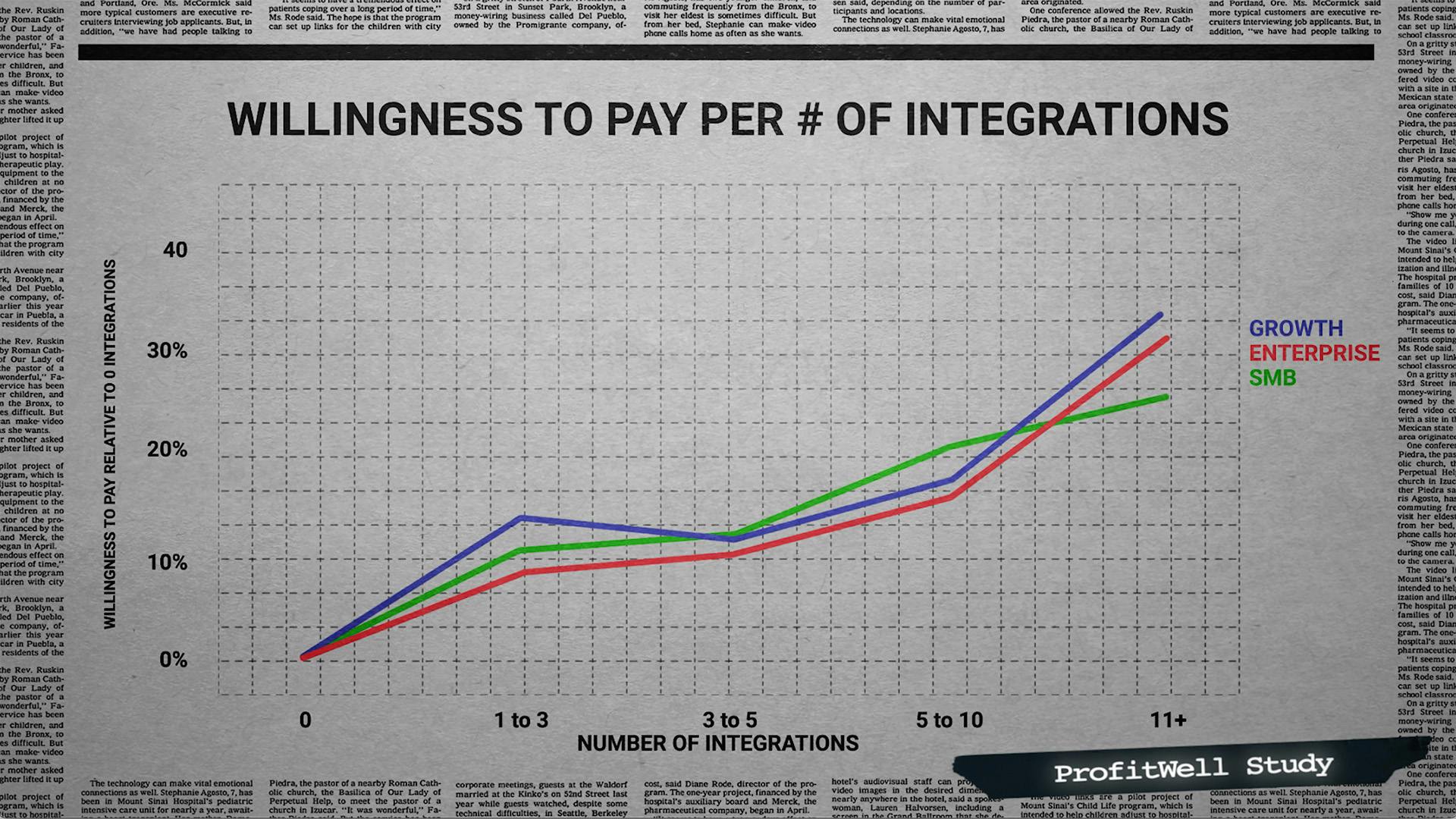
Another factor that helps Intuit stay fresh is they hold on to the startup mindset. They emphasize experimentation including encouraging engineers to use unstructured time to spend on projects of their own choosing. According to then CTO Tayloe Stansbury in 2013, about 300 of those projects turned into products or features of existing products. It’s simple, by encouraging innovation, Intuit is gaining innovation.
But perhaps the greatest reason Microsoft lost to Intuit is because of their efforts in marketing. Robbie Cape ran Microsoft Money from 1999-2001. He said “It really has very little to do with technology. What Intuit and Scott Cook were so formidable at was consumer marketing. He treated marketing Intuit very much the same way as one would treat marketing a bar of soap or bottle of shampoo. He made Quicken a household name.”
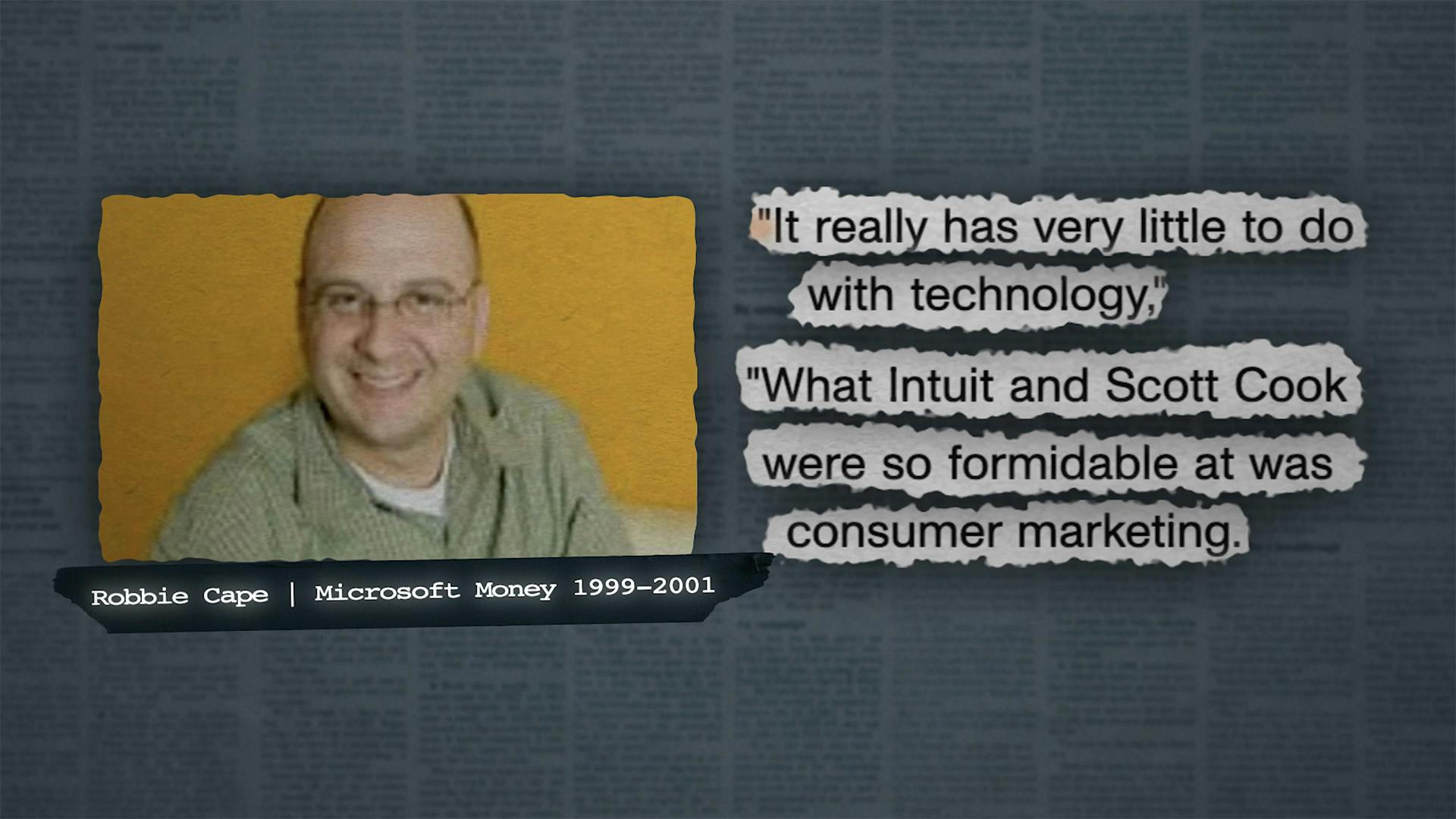
Summary
Today, over 29 million small business owners in the US use QuickBooks to manage their finances. Intuit didn't become the undisputed king of the accounting software space by luck. In retrospect, it's the company's desire to get closer and closer to the customer that got it to its current position. It was able to pull off this feat despite the heavy competition posed by Microsoft, a much bigger company than itself. Today, Intuit is comfortably one of the most valuable SaaS companies out there, with a market cap of $137.04 billion (as of 2020).
But, Intuit shouldn’t get too comfortable. There are still issues they must address within their products. Though Quickbooks is notable in the United States, the same can’t be said for the rest of the world. They have to watch out for folks like Xero in New Zealand, Zoho in India, and Sage in the UK. And while these companies have footings in their own countries, they are making waves abroad as well.
Additionally, the same marketing that turned Quicken into a household name got Intuit into some hot water in May of 2022. Their “free, free, free” ad campaign for TurboTax was found to be using deceptive tactics to drive low-income tax filers toward their services. This was instead of the free federally supported services, which this group qualified for. Intuit paid out a $141M settlement for this clever ad campaign.
Ultimately, a SaaS company that wishes to topple Intuit has to go a few extra miles beyond the incumbent. It must create a formidable relationship with customers and meet them where they are. What company do you think that will be? Xero? Sage? A newbie? Let me know what you think.
If you like this kind of content and want to learn more, subscribe to get in the know when we release new episodes.

1
00:00:00,083 --> 00:00:02,419
- Justice Department
has charged Microsoft.
2
00:00:02,419 --> 00:00:03,795
- Intuit is best in the tax show.
3
00:00:03,795 --> 00:00:05,255
It's crushing H&R Block.
4
00:00:05,255 --> 00:00:07,382
- Hefty fines and prison time.
5
00:00:07,382 --> 00:00:09,843
That's what'll happen if you
don't have your books in order.
6
00:00:09,843 --> 00:00:11,886
You need someone to prevent
all the inaccuracies,
7
00:00:11,886 --> 00:00:14,389
outdated reports, and unverifiable data
8
00:00:14,389 --> 00:00:17,225
that ultimately makes your
back office a living hell.
9
00:00:17,225 --> 00:00:18,435
At the beginning of 2020,
10
00:00:18,435 --> 00:00:19,978
the accounting software market as a whole
11
00:00:19,978 --> 00:00:22,480
was valued at $11.9 billion
12
00:00:22,480 --> 00:00:25,483
and is projected to reach
over 70 billion by 2030.
13
00:00:25,900 --> 00:00:28,319
Several companies are jostling
for the ultimate crown
14
00:00:28,319 --> 00:00:30,697
like Zero, Sage and Zoho.
15
00:00:30,697 --> 00:00:33,324
But one company has been in
the game longer than most.
16
00:00:33,324 --> 00:00:34,159
- Intuit.
- Intuit.
17
00:00:34,159 --> 00:00:34,993
- Intuit.
18
00:00:34,993 --> 00:00:35,827
- I love those guys.
19
00:00:35,827 --> 00:00:37,746
- Today, Intuit has a
vast SaaS product line
20
00:00:37,746 --> 00:00:39,122
from TurboTax to Mint
21
00:00:39,122 --> 00:00:41,916
to their recent acquisition
of Mailchimp in 2021.
22
00:00:41,916 --> 00:00:43,126
But not too long ago,
23
00:00:43,126 --> 00:00:45,545
they endured a decades
long battle with Microsoft
24
00:00:45,545 --> 00:00:48,298
in an effort to win the
top spot in bookkeeping.
25
00:00:48,298 --> 00:00:50,592
At one point, the war seemed to be over
26
00:00:50,592 --> 00:00:52,302
before it could truly begin.
27
00:00:52,302 --> 00:00:53,970
But something happened that forced Intuit
28
00:00:53,970 --> 00:00:56,931
to fend off Microsoft in
any way that they could.
29
00:00:56,931 --> 00:00:58,266
The result of which gives folks
30
00:00:58,266 --> 00:01:01,478
running their own SaaS company
many examples to learn from.
31
00:01:01,478 --> 00:01:02,687
We'll get into all of that soon.
32
00:01:02,687 --> 00:01:04,606
But first, some background.
33
00:01:04,606 --> 00:01:06,900
I'm Ben Hillman and this is "Verticals".
34
00:01:10,403 --> 00:01:12,280
Accounting dates back thousands of years
35
00:01:12,280 --> 00:01:14,240
and has been used in
many parts of the world
36
00:01:14,240 --> 00:01:16,117
from Mesopotamian civilizations
37
00:01:16,117 --> 00:01:20,246
to Italian accounting
pioneer, Luca Paoli in 1494.
38
00:01:20,246 --> 00:01:22,165
But accounting as we know it today
39
00:01:22,165 --> 00:01:24,125
started some time in the last century.
40
00:01:25,210 --> 00:01:28,254
In 1983, Scott Cook went
to Stanford University
41
00:01:28,254 --> 00:01:31,007
and placed an advertisement
for a programmer position.
42
00:01:31,007 --> 00:01:32,884
While there, he bumped into Tom Proulx.
43
00:01:32,884 --> 00:01:35,762
Proulx agreed to write a
simple check balancing program
44
00:01:35,762 --> 00:01:39,432
for Cook which ended up
becoming the Quicken program.
45
00:01:39,432 --> 00:01:42,310
He and Scott used this to launch Intuit.
46
00:01:42,310 --> 00:01:43,561
After a few difficult years
47
00:01:43,561 --> 00:01:45,313
of trying to popularize the product,
48
00:01:45,313 --> 00:01:47,357
Quicken's Apple version finally started
49
00:01:47,357 --> 00:01:48,942
to get positive attention.
50
00:01:48,942 --> 00:01:51,152
Consequently, sales spiked.
51
00:01:51,152 --> 00:01:52,320
By the late 1980s,
52
00:01:52,320 --> 00:01:54,155
Quicken had become one of the best selling
53
00:01:54,155 --> 00:01:56,908
personal accounting
software solutions around.
54
00:01:56,908 --> 00:02:00,203
Suddenly, Intuit had a little
problem securing financing,
55
00:02:00,203 --> 00:02:02,038
courting several VCs.
56
00:02:02,038 --> 00:02:04,332
In 1993 Intuit went public.
57
00:02:04,332 --> 00:02:06,501
By this time, Microsoft had
launched their own product
58
00:02:06,501 --> 00:02:10,255
to compete with Quicken releasing
Microsoft Money in 1991.
59
00:02:10,255 --> 00:02:13,633
But realizing that Intuit
was in the lead by far,
60
00:02:13,633 --> 00:02:16,302
Microsoft made an offer
that they couldn't refuse.
61
00:02:17,554 --> 00:02:20,890
In October of 1994, Microsoft
offered to purchase Intuit
62
00:02:20,890 --> 00:02:24,144
in a stock swap for $1.5 billion.
63
00:02:24,144 --> 00:02:27,480
At the time, it was Microsoft's
largest acquisition ever.
64
00:02:27,480 --> 00:02:29,649
Speaking of the acquisition,
Bill Gates said,
65
00:02:29,649 --> 00:02:32,819
"Intuit is a phenomenal company
and it is a unique situation
66
00:02:32,819 --> 00:02:35,196
where the sum is greater than the parts.
67
00:02:35,196 --> 00:02:37,532
Certainly, managing finances
in the broadest sense
68
00:02:37,532 --> 00:02:40,118
is one of the major opportunities
that the electronic world
69
00:02:40,118 --> 00:02:42,370
will present, and
Microsoft wants to be there.”
70
00:02:42,370 --> 00:02:44,873
...And this victory will be shortlived.
71
00:02:44,873 --> 00:02:47,292
The US Department of Justice
sued to block the deal,
72
00:02:47,292 --> 00:02:49,419
citing that it would
effectively give Microsoft
73
00:02:49,419 --> 00:02:52,213
a monopoly of the personal finance market.
74
00:02:52,213 --> 00:02:53,882
In their research, the Justice Department
75
00:02:53,882 --> 00:02:57,427
found that Intuit's Quicken
commanded 69% of the market
76
00:02:57,427 --> 00:03:00,013
while Microsoft Money had 22%.
77
00:03:00,013 --> 00:03:02,891
Ultimately, Microsoft decided
to pull out of the deal.
78
00:03:02,891 --> 00:03:06,311
During negotiations, Bill Gates
reportedly told Scott Cook
79
00:03:06,311 --> 00:03:08,605
that if Scott fought the
merger, he would use the sum
80
00:03:08,605 --> 00:03:10,648
that would've gone
towards the acquisition,
81
00:03:10,648 --> 00:03:15,069
towards battling Intuit, and
the battle had just begun.
82
00:03:15,069 --> 00:03:18,156
Microsoft went all out to
try and dethrone Intuit.
83
00:03:18,156 --> 00:03:20,366
The company added a ton of partners,
84
00:03:20,366 --> 00:03:23,077
revamped the product's
design, and tried to integrate
85
00:03:23,077 --> 00:03:25,622
a host of new financial planning tools.
86
00:03:25,622 --> 00:03:29,000
An advantage that Intuit had
was its QuickBooks software
87
00:03:29,000 --> 00:03:30,793
intended to offer small business owners
88
00:03:30,793 --> 00:03:33,338
the same flexibility,
structure and compliance
89
00:03:33,338 --> 00:03:34,964
as Quicken did for individuals.
90
00:03:34,964 --> 00:03:37,675
- From the Make us of Quicken,
so you know it's easy to use.
91
00:03:37,675 --> 00:03:39,761
- And in 2000, the software was improved
92
00:03:39,761 --> 00:03:41,763
to include audit trials, double entries,
93
00:03:41,763 --> 00:03:44,098
and other industry level compliant items.
94
00:03:44,098 --> 00:03:46,809
- It integrates with
Microsoft Word and Excel.
95
00:03:46,809 --> 00:03:48,978
- That same year, Wall
Street Journal reviewer,
96
00:03:48,978 --> 00:03:52,690
Walt Mossberg gave Microsoft
Money the edge over Quicken.
97
00:03:52,690 --> 00:03:55,443
However, even with this positive review,
98
00:03:55,443 --> 00:03:58,363
Money never truly managed
to overtake Intuit.
99
00:03:58,363 --> 00:04:01,032
Microsoft tried one last time in 2005
100
00:04:01,032 --> 00:04:02,533
to outmaneuver Intuit.
101
00:04:02,533 --> 00:04:05,620
They launched Small Business
Accounting to rival QuickBooks.
102
00:04:05,620 --> 00:04:07,497
But like all the previous episodes,
103
00:04:07,497 --> 00:04:09,123
the moved backfired badly.
104
00:04:09,958 --> 00:04:13,253
Intuit VP Dan Levin said
they've come up against Intuit
105
00:04:13,253 --> 00:04:15,380
six times in the past and each time
106
00:04:15,380 --> 00:04:17,548
they've retreated with a bloody nose.
107
00:04:17,548 --> 00:04:20,051
It seems as if the battle had just ended.
108
00:04:21,427 --> 00:04:23,763
In 2009, Microsoft announced
that Microsoft Money
109
00:04:23,763 --> 00:04:25,807
would no longer be available for purchase.
110
00:04:25,807 --> 00:04:29,102
Competition had been fierce,
but ultimately Intuit went out.
111
00:04:29,102 --> 00:04:31,271
It was somewhat surprising
that Intuit succeeded
112
00:04:31,271 --> 00:04:33,356
especially considering
many computer makers
113
00:04:33,356 --> 00:04:35,817
preloaded Microsoft Money on new PCs.
114
00:04:35,817 --> 00:04:36,985
So, what were the key differences
115
00:04:36,985 --> 00:04:39,570
that made Intuit soar
and Microsoft plunge?
116
00:04:40,571 --> 00:04:42,907
The main reason that Intuit
knocked out Microsoft Money
117
00:04:42,907 --> 00:04:44,659
is because they've always continued
118
00:04:44,659 --> 00:04:47,120
to get closer and closer to the customer,
119
00:04:47,120 --> 00:04:50,206
including going above and
beyond to correct errors.
120
00:04:50,206 --> 00:04:52,875
In 1987, for instance,
Intuit got complaints
121
00:04:52,875 --> 00:04:55,295
from Quicken customers who
were only getting the message
122
00:04:55,295 --> 00:04:59,048
get cash on the screen when
trying to record a transaction.
123
00:04:59,048 --> 00:05:02,302
This was back when Intuit was
strictly an on-prem solution.
124
00:05:02,302 --> 00:05:04,804
20,000 copies had already been sold,
125
00:05:04,804 --> 00:05:08,016
so Intuit staff created
20,000 bug free discs
126
00:05:08,016 --> 00:05:10,893
and mailed one to every
single customer for free.
127
00:05:10,893 --> 00:05:13,646
As a result, customer
satisfaction increased.
128
00:05:13,646 --> 00:05:15,648
Additionally, Intuit
has made it its mission
129
00:05:15,648 --> 00:05:17,650
to pursue strategic acquisitions
130
00:05:17,650 --> 00:05:19,902
that play to this overarching goal.
131
00:05:19,902 --> 00:05:23,197
Acquiring platforms like Credit
Karma, Mint and Mailchimp
132
00:05:23,197 --> 00:05:25,867
are aimed at solving pain
points tangentially related
133
00:05:25,867 --> 00:05:27,910
to Intuit's core accounting offering.
134
00:05:27,910 --> 00:05:29,954
Credit Karma allows the
company to give folks
135
00:05:29,954 --> 00:05:33,458
their credit score on demand
which makes the product sticky.
136
00:05:33,458 --> 00:05:35,501
Mint is an automatic tracker of finances
137
00:05:35,501 --> 00:05:38,588
which plugs right into
Intuit's tax software.
138
00:05:38,588 --> 00:05:40,173
Mailchimp is a fantastic tool
139
00:05:40,173 --> 00:05:43,009
that helps businesses send better emails.
140
00:05:43,009 --> 00:05:44,802
For more on Mailchimp, you can check out
141
00:05:44,802 --> 00:05:47,680
our previous episode about
how Mailchimp gets your email
142
00:05:47,680 --> 00:05:49,432
past the spam filter.
143
00:05:49,432 --> 00:05:51,100
In 2011, further expanding
144
00:05:51,100 --> 00:05:52,810
on its well-rounded solution offering,
145
00:05:52,810 --> 00:05:56,230
the company also launched a
platform called Intuit Anywhere
146
00:05:56,230 --> 00:05:58,691
which allowed customers to
try out different integrations
147
00:05:58,691 --> 00:06:01,235
within the QuickBooks online ecosystem.
148
00:06:01,235 --> 00:06:03,363
Ultimately, this turned
into the integrations
149
00:06:03,363 --> 00:06:04,947
that Intuit offers today.
150
00:06:04,947 --> 00:06:08,117
With options like Shopify,
Gusto, and even Etsy.
151
00:06:08,117 --> 00:06:09,786
Integrations are important.
152
00:06:09,786 --> 00:06:12,580
In a study, we found that
customers with more integrations
153
00:06:12,580 --> 00:06:14,999
within their product
appear to be willing to pay
154
00:06:14,999 --> 00:06:19,379
between 10 and 30% more than
those without integrations.
155
00:06:19,379 --> 00:06:21,422
Another factor that
helps Intuit stay fresh
156
00:06:21,422 --> 00:06:23,800
is they hold on to the startup mindset.
157
00:06:23,800 --> 00:06:26,677
At one point, they call themselves
the 30-year-old startup.
158
00:06:26,677 --> 00:06:28,262
They emphasize experimentation,
159
00:06:28,262 --> 00:06:31,182
including encouraging engineers
to use unstructured time
160
00:06:31,182 --> 00:06:34,394
to spend on projects
of their own choosing.
161
00:06:34,394 --> 00:06:38,106
According to then CTO
Tayloe Stansbury in 2013,
162
00:06:38,106 --> 00:06:41,067
about 300 of those projects
turned into products
163
00:06:41,067 --> 00:06:43,319
or features of existing products.
164
00:06:43,319 --> 00:06:44,195
It's simple.
165
00:06:44,195 --> 00:06:47,573
By encouraging innovation,
Intuit is gaining innovation.
166
00:06:47,573 --> 00:06:50,076
But perhaps the greatest
reason Microsoft lost to Intuit
167
00:06:50,076 --> 00:06:52,537
is because of their efforts in marketing.
168
00:06:52,537 --> 00:06:56,374
Robbie Cape ran Microsoft
Money from 1999 to 2001.
169
00:06:56,374 --> 00:06:59,419
He said, "It really has
little to do with technology.
170
00:06:59,419 --> 00:07:02,046
What Intuit and Scott
Cook were so formidable at
171
00:07:02,046 --> 00:07:03,840
was consumer marketing.
172
00:07:03,840 --> 00:07:06,092
He treated marketing Intuit
very much the same way
173
00:07:06,092 --> 00:07:08,261
as one would treat marketing a bar of soap
174
00:07:08,261 --> 00:07:10,012
or a bottle of shampoo.
175
00:07:10,012 --> 00:07:11,973
He made Quicken a household name."
176
00:07:11,973 --> 00:07:15,268
- If you can use a checkbook,
you can use Quicken.
177
00:07:15,268 --> 00:07:17,353
- Today, Intuit is comfortably
178
00:07:17,353 --> 00:07:19,939
one of the most valuable
SaaS companies out there
179
00:07:19,939 --> 00:07:23,151
with a market cap of over $100 billion.
180
00:07:23,151 --> 00:07:25,236
But Intuit shouldn't get too comfortable.
181
00:07:25,236 --> 00:07:27,071
There are still issues they must address
182
00:07:27,071 --> 00:07:28,573
within their own products.
183
00:07:28,573 --> 00:07:30,575
Though QuickBooks is notable
in the United States,
184
00:07:30,575 --> 00:07:32,952
the same can't be said
for the rest of the world.
185
00:07:32,952 --> 00:07:35,872
They have to watch out for
folks like Zero in New Zealand,
186
00:07:35,872 --> 00:07:38,791
Zoho in India and Sage in the UK.
187
00:07:38,791 --> 00:07:40,209
And while these companies have footings
188
00:07:40,209 --> 00:07:43,838
in their own countries, they're
making waves abroad as well.
189
00:07:43,838 --> 00:07:46,257
Additionally, the same
marketing that turned Quicken
190
00:07:46,257 --> 00:07:48,217
into a household name got Intuit
191
00:07:48,217 --> 00:07:50,511
into some hot water in May of 2022.
192
00:07:50,511 --> 00:07:53,222
Their free, free, free
ad campaign for TurboTax
193
00:07:53,222 --> 00:07:55,391
was found to be using deceptive tactics
194
00:07:55,391 --> 00:07:58,686
to drive low income tax
filers toward their services.
195
00:07:58,686 --> 00:08:00,897
This was instead of the free
federally supported services
196
00:08:00,897 --> 00:08:02,899
which this group qualified for.
197
00:08:02,899 --> 00:08:05,902
Intuit paid out 141 million settlement
198
00:08:05,902 --> 00:08:07,195
just for this ad campaign.
199
00:08:07,195 --> 00:08:09,947
Ultimately, a SaaS company
that wishes to topple Intuit
200
00:08:09,947 --> 00:08:12,658
has to go a few extra
miles beyond the incumbent.
201
00:08:12,658 --> 00:08:14,285
What company do you think that will be?
202
00:08:14,285 --> 00:08:17,288
Zero, Sage, maybe a newbie?
203
00:08:17,288 --> 00:08:19,332
Let me know what you think
in the comments down below.
204
00:08:19,332 --> 00:08:21,667
From Paddle, I'm Ben Hillman,
205
00:08:21,667 --> 00:08:23,169
and I'm not gonna cross Intuit.



